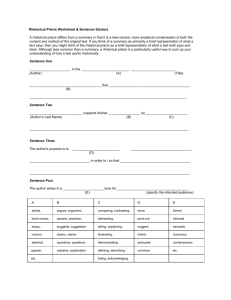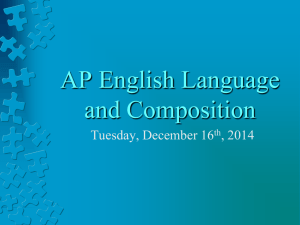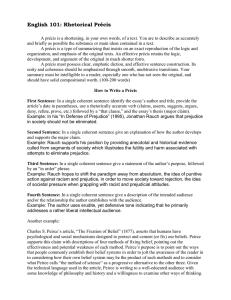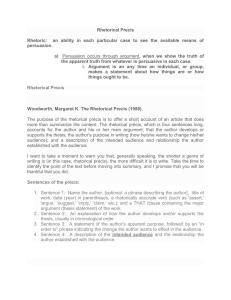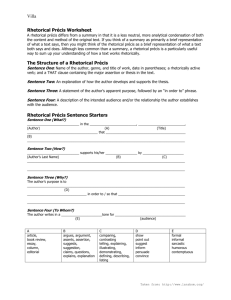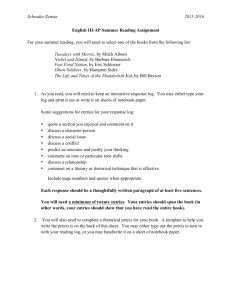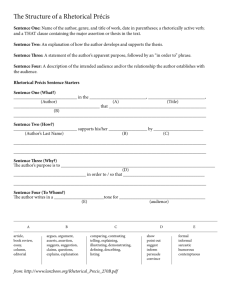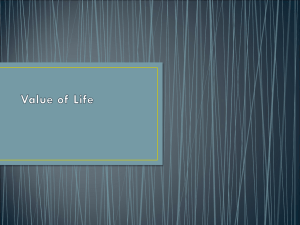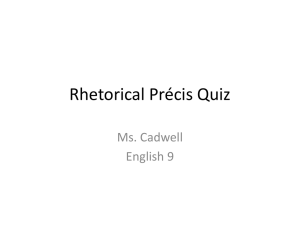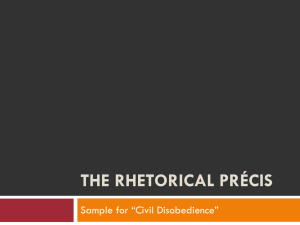Rhetorical Précis
advertisement
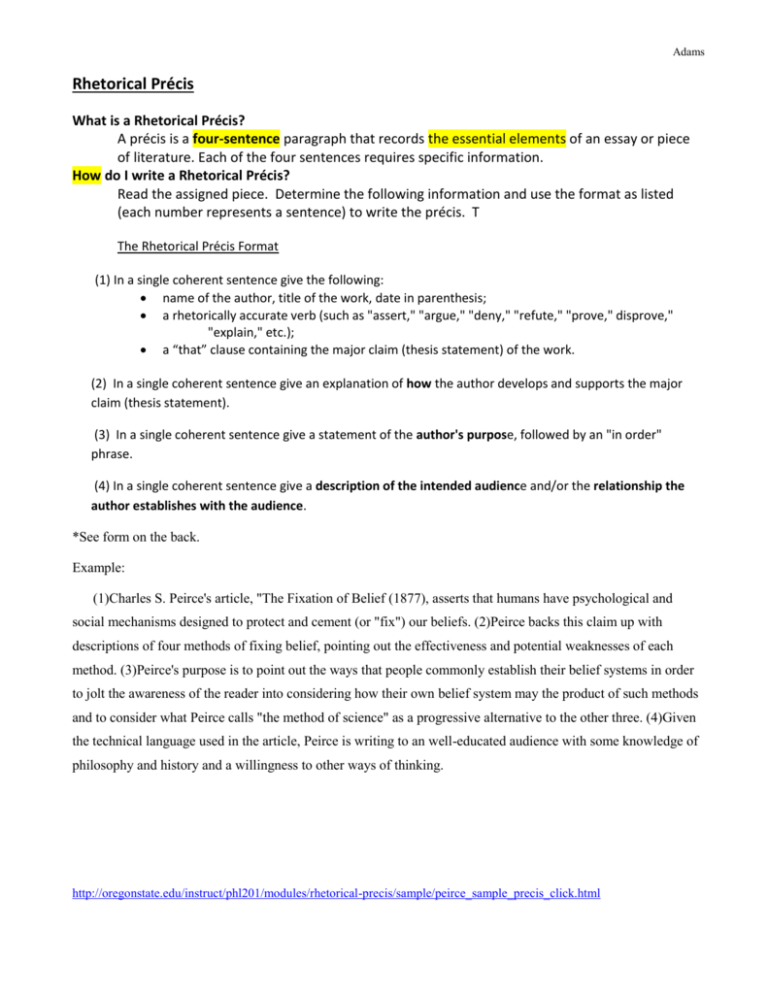
Adams Rhetorical Précis What is a Rhetorical Précis? A précis is a four-sentence paragraph that records the essential elements of an essay or piece of literature. Each of the four sentences requires specific information. How do I write a Rhetorical Précis? Read the assigned piece. Determine the following information and use the format as listed (each number represents a sentence) to write the précis. T The Rhetorical Précis Format (1) In a single coherent sentence give the following: name of the author, title of the work, date in parenthesis; a rhetorically accurate verb (such as "assert," "argue," "deny," "refute," "prove," disprove," "explain," etc.); a “that” clause containing the major claim (thesis statement) of the work. (2) In a single coherent sentence give an explanation of how the author develops and supports the major claim (thesis statement). (3) In a single coherent sentence give a statement of the author's purpose, followed by an "in order" phrase. (4) In a single coherent sentence give a description of the intended audience and/or the relationship the author establishes with the audience. *See form on the back. Example: (1)Charles S. Peirce's article, "The Fixation of Belief (1877), asserts that humans have psychological and social mechanisms designed to protect and cement (or "fix") our beliefs. (2)Peirce backs this claim up with descriptions of four methods of fixing belief, pointing out the effectiveness and potential weaknesses of each method. (3)Peirce's purpose is to point out the ways that people commonly establish their belief systems in order to jolt the awareness of the reader into considering how their own belief system may the product of such methods and to consider what Peirce calls "the method of science" as a progressive alternative to the other three. (4)Given the technical language used in the article, Peirce is writing to an well-educated audience with some knowledge of philosophy and history and a willingness to other ways of thinking. http://oregonstate.edu/instruct/phl201/modules/rhetorical-precis/sample/peirce_sample_precis_click.html Adams Rhetorical Précis Sentence Starter Sentence One (What?) In the _______________ _________________________ , _________________________ ______________________ (A) (Title) (Authors) (B1) that ___________________________________________________________________________________________. Sentence Two (How?) ____________________________ supports his/her _____________________ by ______________________________ (Author’s Last Name) (B2) (C) ___________________________________________________________________________________________. Sentence Three (Why?) The author’s purpose is to _______________ ____________________________________________________________ (D) _______________________________________ in order to / so that ________________________________________. Sentence Four (To Whom?) The author writes in a __________________________tone for ______________________________________________. (E) (audience) Suggestions for words to use in blanks: A article, book review, essay, column, editorial, story B1/B2 Argues/argument, Asserts/assertion, Suggests/suggestion, Claims/claim Questions/question explains,/explanation C comparing, contrasting, telling, explaining, illustrating, demonstrating, defining, describing, listing, providing D show, point out, suggest, inform, persuade, convince E formal, informal, serious, sarcastic, humorous, contemptuous Rhetorical Précis Example*: Natalia Leyva Professor Beach ED 200 11 September 2009 Rhetorical Précis: “End Homework Now” In the article “End Homework Now” (2001), Etta Kralovec and John Buell claim that the practice of assigning homework is not an effective teaching method because its negative effects outweigh its benefits. Kralovec and Buell support their claims by providing examples of how homework disrupts families, overburdens children, and limits learning and by dispelling myths about the benefits of homework and providing alternative practices that would lead to improvement in student achievement. The authors’ purpose is to convince the reader to question a practice that is a trademark of the U.S. education system and decide whether it is conducive to creating a “smarter” student. They write in a formal tone and seem to be speaking to the entire educational community: administrators, teachers, students and parents. MLA citation: Kralovec, Etta, and John Buell. “End Homework Now.” Time. 12 May 2001: 36-39. Print. *If typed for a graded assignment, this would all be double-spaced! Adams rhetoric (noun) - the art of effective or persuasive speaking or writing, especially the use of figures of speech and other compositional techniques. *rhetorical (adjective) – describes speaking or writing that is effective and/ or persuasive
